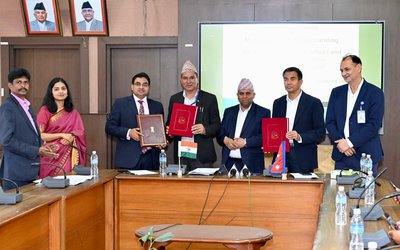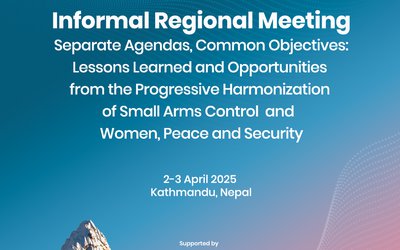
When US ambassador to Nepal Alaina B. Teplitz visited the earthquake victims of Bhaktapur, the elderly women felt a sigh of relief while sharing their difficulties. The women farmers in Surkhet enjoyed telling US ambassador about their agriculture production.
For the first eight months of her tenure, US Ambassador to Nepal Alaina B. Teplitz travelled to different parts of remote Nepal inspecting the projects run by USAID and meeting locals and earthquake victims and listening to their voices. She also visited mid-western and far western regions to meet the people and observe various programs.
When she visited Dhangadhi, ambassador Teplitz observed the distribution of citizenship cards with Kailali Chief District Officer. Ambassador Teplitz also met two groups of students at American Corner Dhangadhi. She also met the members of community forest users group and learned about its work. The Ambassador spoke with local FM and talked about U.S. investment and assistance in the Far Western region.
US ambassador Teplitz visited mid-west meeting the farmers and other stakeholders benefiting from the USAID projects and programs. In rural areas, ambassador Teplitz spared her time hearing the rural folks.
As she learnt more about challenges in rural Nepal, she addressed intellectuals and academicians at the TU memorial hall (Smriti Bhawan), near T.U Central Office, Kirtipur.
Unlike in the rural and remote parts of Nepal where rural women, farmers and district level officials were more concerned on issues like production and service delivery and strengthening institutional capability, the audiences gathered at TU Memorial questioned on other perspectives, including US Policy towards Nepal, Nepal’s efforts at regional cooperation and importance of regional economic integration for long term economic growth.
Addressing the program at Tribhuvan University on US policy towards South Asia in general and Nepal in particular, US ambassador to Nepal Teplitz said the rationale behind Washington’s efforts towards regional integration “rests on the belief that prosperity, peace and stability are more likely to be sustained when the countries of the region are tied together in trade and economic agreements and in physical infrastructure connections.”
Discussing challenges in South Asia, US Ambassador Teplitz said there are challenges to achieving greater peace and prosperity within South Asia due to history, politics, philosophy and bureaucracy. “These barriers are real, and until greater priority is placed on identifying shared interests and finding common ground, South Asia will continue to fall far short of its tremendous potential as a stable, global economic catalyst,” said Teplitz.
In her deliberation, the ambassador presented the comparative trade data of ASEAN nations, Eastern and Southern Africa. She stressed that the regional connectivity is a must for South Asian nationals if they are to remain the beneficiaries of global economic growth.
“While landlocked countries have to rely on neighbors in different ways than those with access to the sea, there can be advantages… and this is true for Nepal,” she said. “Representatives from an American company recently told us that they envision setting up a factory in the Terai where they can distribute their products to underserved markets in India’s Bihar and Uttar Pradesh states.”
Stressing that increased regional trade is a key step to improving Nepal’s economy and the region, ambassador Teplitz said there needs to be a business climate conducive to investment. “If Nepal is to meet its goal of graduating to LDC from least developed country status, it will need to dramatically increase private investment," said ambassador.
In her first wider interaction in capital Kathmandu ambassador Alaina B Teplitz replied to all questions posed by the audiences. She said the US policy towards South Asia is promoting regional economic collaboration and Washington supports a democratic, prosperous and stable Nepal.
The US envoy also said that Nepal has immense resources, particularly hydropower for prosperity. She said that the Nepal government needs to take serious steps to make Neal a more attractive destination for foreign investment.
For over the last seven decades, United States has been supporting Nepal to strengthen the rural institutions supporting Nepal’s quest for development. At a time when Nepal has been passing through a very difficult time, the assurance given by US Ambassador Teplitz in continuation of US policy towards Nepal was comforting. From meeting people, addressing farmers in Dhangadhi, Surkhet and sharing feelings with earthquake victims in Bhaktapur, ambassador Teplitz has been trying to identify with the feelings of Nepalese.
- IME GROUP: Expands Into Paper Industry
- Mar 24, 2025
- CPN UML: Instigated By India
- Mar 23, 2025
- ADB’S CHIEF ECONOMIST: Nepal Reduces Poverty
- Mar 11, 2025
- FM DR. DEUBA: A Successful Visit
- Mar 11, 2025
- MD GHISING: Target Of Personal Grudge
- Mar 09, 2025














